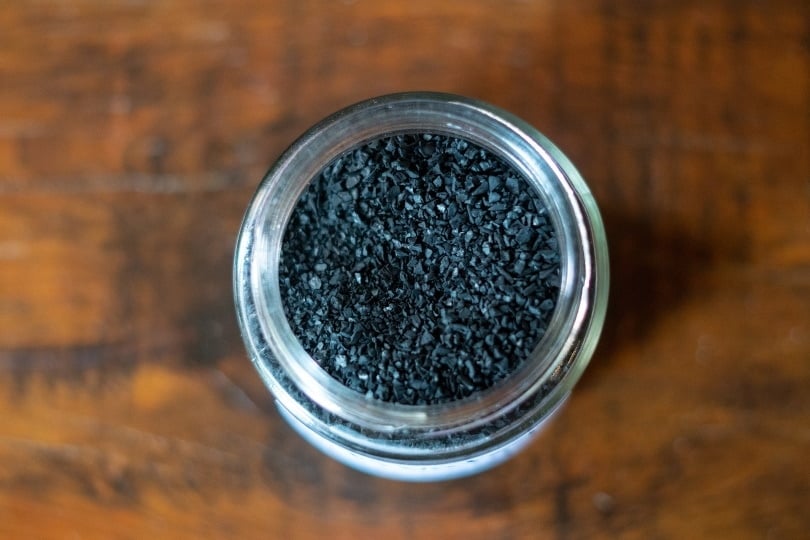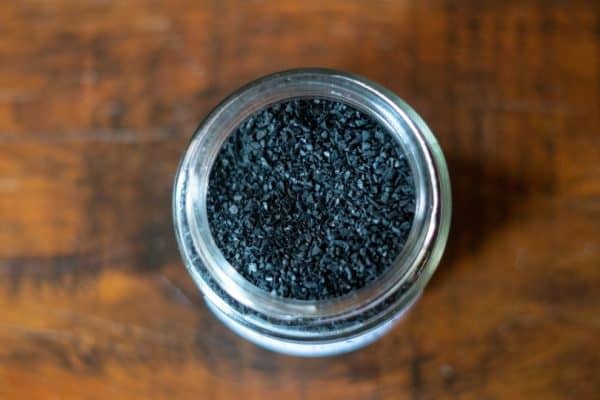Dogs are infamous for getting into things they’re not supposed to, and that’s not just limited to food! Even the bag of charcoal left by your grill outside can pique their interest and become a snack. When your dog eats charcoal or anything else that’s potentially harmful, we must urge you to consult with a vet. Only they’re qualified to advise you on the severity of the situation and what to do.
With that said, a small amount of charcoal, like a bite or a briquette, isn’t likely to cause serious harm. Charcoal isn’t outright toxic to dogs but can cause problems when they eat a lot of it or eat it over prolonged periods. Lighter fluid, however, is toxic to dogs and could be present in the charcoal. Read on for tips on exactly what you’re supposed to do when your dog eats charcoal.
What to Do When Your Dog Eats Charcoal
1. Remove Your Dog & Assess the Situation
The very first thing to do after you realize your dog ate charcoal is to physically remove them from the area and bring them inside. If they made a mess of charcoal, ashes, or anything else, that can wait unless something’s literally on fire. However, make sure to not leave any flammable lighter fluid spills unattended!
If your dog simply ate a little briquette out of the bag and appears fine, it’s possible they’re okay, but it depends on their body weight. Larger dogs that eat a little bit of charcoal are more likely to be okay versus a small dog eating charcoal. Also, make sure you have a bag of the charcoal on hand so you know what type you used, some types of charcoal have added chemicals that may be toxic to your dog. This may be important later.
At this point, you should also call your dog’s vet. It’s likely they’ll have you watch your dog offer plenty of water for the time being, which are our next steps. If they say to come in right away, do that instead.
Two other resources in the US include the ASPCA Pet Poison Control Hotline and the Pet Poison Helpline. Both have 24/7 hotlines you can contact for help and advise when your dog eats something potentially harmful. Fees may apply for online or phone consultations.
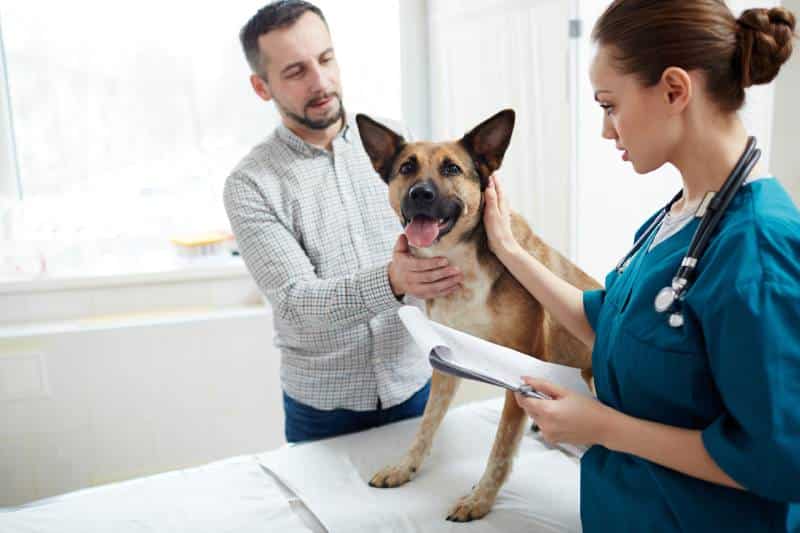
2. Rinse & Dilute With Water
Dogs don’t have the same sense of heat that we do, which can lead to them burning themselves by eating food that’s too hot or even eating lit charcoal. If they did, that can cause some serious burns to their mouth, throat, and even stomach.
Once your dog is inside, give them plenty of cool water and rinse any visible burns with water. This will also dilute any lighter fluid that gets in your dog’s system, which is far more toxic than charcoal.
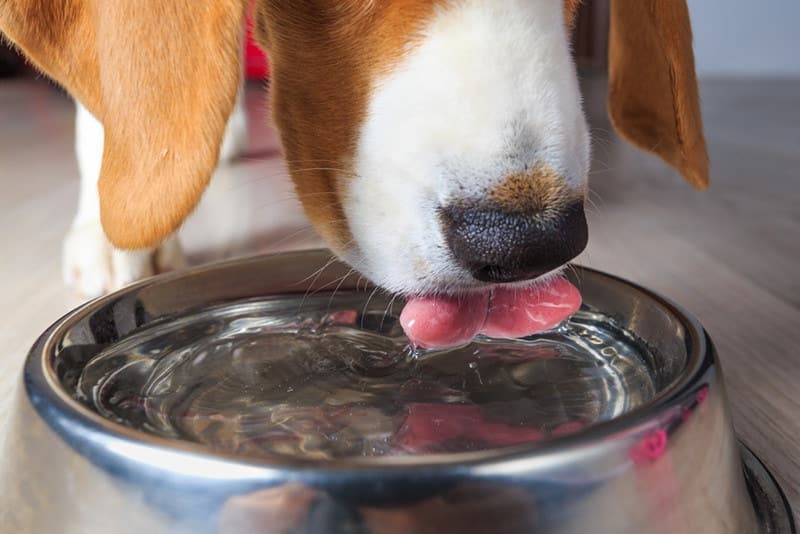
3. Watch for Negative Signs
Charcoal itself isn’t poisonous but can pose serious health risks if your dog eats enough or if it contains other harmful chemicals. Vomiting, diarrhea, and lethargy are common if your dog ate larger amounts. The biggest risk is a large piece of charcoal becoming lodged in the stomach or intestines, and an intestinal blockage will likely need surgery. As far as lighter fluid toxicity, scroll below for the biggest signs to be on the lookout for.
- Vomiting
- Hypersalivation
- Panting
- Diarrhea
- Lethargy
- Abdominal pain
If your dog displays any of these signs right after eating charcoal, immediately move to the next step.
4. Visit Your Vet
Your veterinarian may ask you to monitor your dog at home after ingesting charcoal. However, if your dog is acting strangely and exhibiting any of the signs we mentioned in the last section, you should immediately call your vet and bring them in to get checked out.
Be ready to answer what type of charcoal they ate, whether it was lit, if your dog got burned, whether they ate ashes, and whether there was any lighter fluid present. In some instances, your vet may induce vomiting and perhaps order additional tests if needed. Do not induce vomiting at home unless specifically instructed to do so by your vet. If your dog ate a large piece of charcoal and there’s now a blockage in their GI system, surgery could even be necessary. It’s vital that you honestly answer any and all questions your vet asks to help them decide the best course of action.
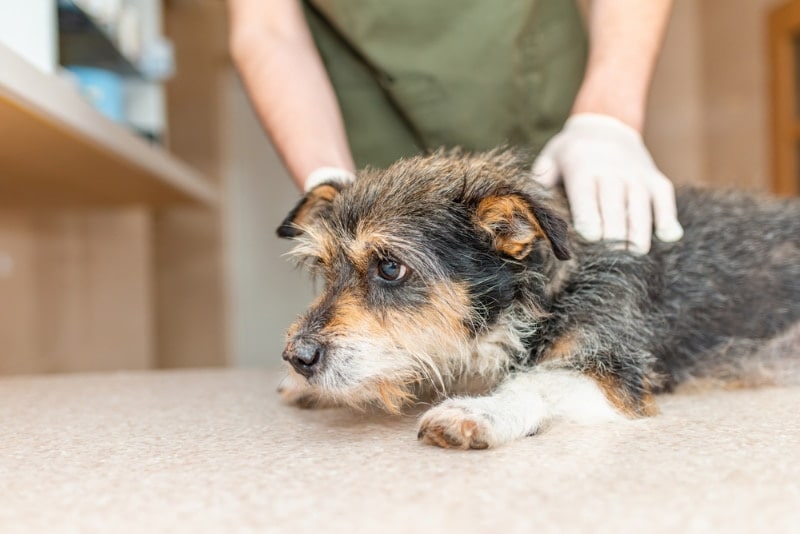
5. Monitor Your Dog
Even if your vet gives your dog a clean bill of health, you should observe them closely for the next day or two. Unless it was a serious incident, your dog shouldn’t suffer any recurring effects from eating charcoal. Lighter fluid toxicity may have lingering effects, like vomiting or diarrhea, but make sure your dog has plenty of fresh water and it should pass.
Why Is Charcoal Harmful to Dogs?
Charcoal on its own isn’t toxic to dogs, and in fact, activated charcoal is sometimes used by vets to absorb toxins in pets. Activated charcoal is also an ingredient in some dog dental treats. It’s usually the lighter fluid and whether the charcoal was lit that poses the most serious danger. In some cases where your dog ate whole or large pieces of charcoal, it can cause a gastrointestinal obstruction and become an emergency. It’s best to keep all types of charcoal and lighter fluid away from your dog, and if possible, to keep your dog away from any barbecue with lit charcoal.
Conclusion
Charcoal isn’t the most toxic thing your dog can get into and ingesting a small amount usually doesn’t cause an emergency. Still, we urge you to call your vet ASAP when it happens and to follow their advice. In the meantime, you can help rinse your dog’s mouth and keep an eye out for dangerous signs of toxicity.
Featured Image Credit: KawikaFilms, Pixabay

